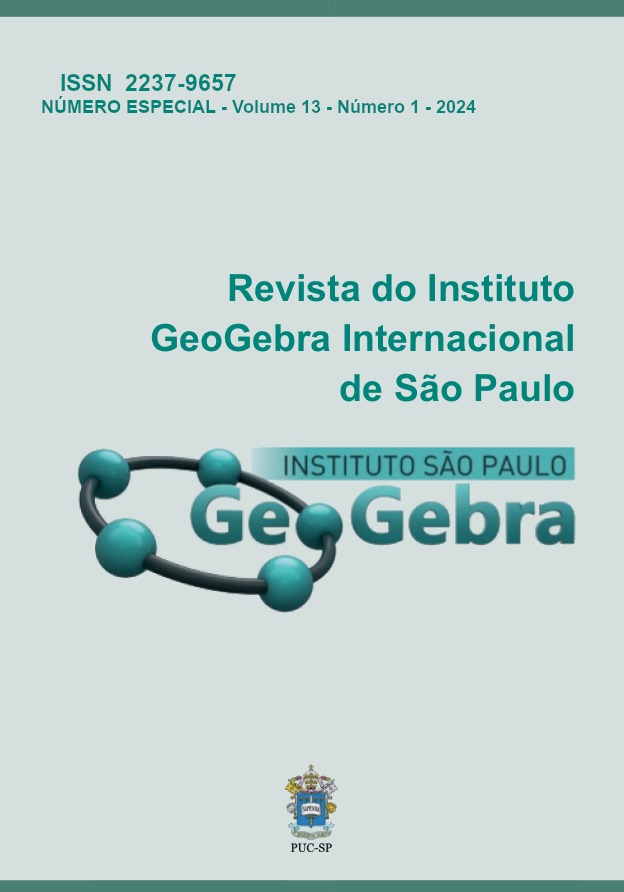The use of GeoGebra & STEAM Education as a strategy for meaningful learning of Trigonometric Function Transformations
DOI:
https://doi.org/10.23925/2237-9657.2024.v13i1p161-195Keywords:
GeoGebra and STEAM Education, Transformations of Trigonometric Functions, Meaningful LearningAbstract
Following our participation in the “GeoGebra & STEAM” Training Workshop within the scope of the post-doctoral research project under the title “GeoGebra and STEAM implications for Mathematics and Natural Sciences Education in Mozambique”. The present work results from an experience carried out in the 12th class of class B1-1, at Munhuana Secondary School, to approach the Transformations of Trigonometric Functions supported by GeoGebra in the context of STEAM Education. The case study, essentially qualitative, of an exploratory and interpretative nature, aims to promote meaningful learning of these contents, from an interdisciplinary teaching perspective. The results indicate that the use of GeoGebra enabled significant learning of the content covered. Therefore, in this article, we intend to bring the results of implementing this experience and promote a reflection on the implications of using GeoGebra in the context of STEAM Education in Mozambique.
References
BILA, V.L & RODRIGUES, A. Módulo de Psicologia de Desenvolvimento e de Aprendizagem – Ensino à Distância. Universidade Pedagógica.
CANAVARRO, A. P. (2011). Ensino exploratório da Matemática: Práticas e desafios. Educação e Matemática (115), 11-17.
DOS SANTOS, J. D. S., & SILVEIRA, A. Abordagem STEAM e GeoGebra - Aprendizagem e ensino das Ciências na formação de professores de Cabo Verde, 2021. Disponível em https://parc.ipp.pt/index.php/sensos/article/download/4302/2560.
GARCIA, S.F. GeoGebra e o ensino de funções trigonométricas: percepções dos estudantes do Ensino Médio. Porto Alegre, 2021 Disponível em https://tede2.pucrs.br/tede2/bitstream/tede/10594/2/Disserta%C3%A7%C3%A3o _FernandaDosSantosGarcia_Homologacao.pdf
GERHARDT, E.T & SILVEIRA, T.D. Métodos de pesquisa. 1ª edição. Universidade Federal do Rio Grande do Sul, 2009. Disponível em https://www.ufrgs.br/cursopgdr/downloadsSerie/derad005.pdf.
GOULART, M. Psicologia de Aprendizagem I Belo Horizonte, 2010.
JESUS, D. O uso do software GeoGebra para o ensino de funções do 2º grau: caso da 1ª série do Ensino Médio de uma Escola Federal. Lajeado, 2018. Disponível em https://www.univates.br/bdu/bitstream/10737/2491/1/2018DanilodoNascimentodeJesus.pdf.
MINEDH. Matemática - Programa de Ensino da 11ª e 12ª classes, 2011.
NEVES, A.F & SILVA, N. J Matemática 12ª classe, Plural Editores, 2017.
PIAGET, J. Para onde vai a educação? 3ª edição. Rio de Janeiro, 1975.
PONTE, J.P. Gestão Curricular em Matemática, Professor e o desenvolvimento curricular. Lisboa, 2005.
SOARES, J. S. Pesquisa científica: uma abordagem sobre o método qualitativo. Montes Claras, 2019. Disponível em https://www.periodicos.unimontes.br/index.php/ciranda/article/view/314.
SOUSA, J. Uso do GeoGebra no ensino da Matemática. Lajeado, 2018. Disponível em https://www.univates.br/bdu/bitstreams/af54e2a0-e31946ac84967625df6c1caa/download.
ROSA, N. Trigonometria - Ciência em Desenvolvimento, 2014.
TEMPORINI, E. & PIOVESAN, A. Pesquisa exploratória: procedimento metodológico para o estudo de fatores humanos no campo da saúde pública. Universidade de São Paulo – Brasil.1995. Disponível em https://www.scielo.br/j/rsp/a/fF44L9rmXt8PVYLNvphJgTd/.
VUMA, J. P & CHERINDA, M. Matemática - 11ª classe. Logman 1ª edição. Maputo, 2009.
Downloads
Published
How to Cite
Issue
Section
License
Copyright (c) 2024 Revista do Instituto GeoGebra Internacional de São Paulo

This work is licensed under a Creative Commons Attribution 4.0 International License.
Submission, processing, and publication of articles sent to the journal and registration of the DOI at Crossref is free of charge.
Authors retain their copyright and grant the journal the right of first publication of their article, which is simultaneously licensed under a Creative Commons - Attribution 4.0 International license CC BY that allows others to share the article by acknowledging its authorship and initial publication by the journal.
The GeoGebra journal encourages its authors to register their work with information and communication management systems aimed at researchers, such as Academia.edu, Mendeley, ResearchGate, etc.


 10.23925
10.23925
